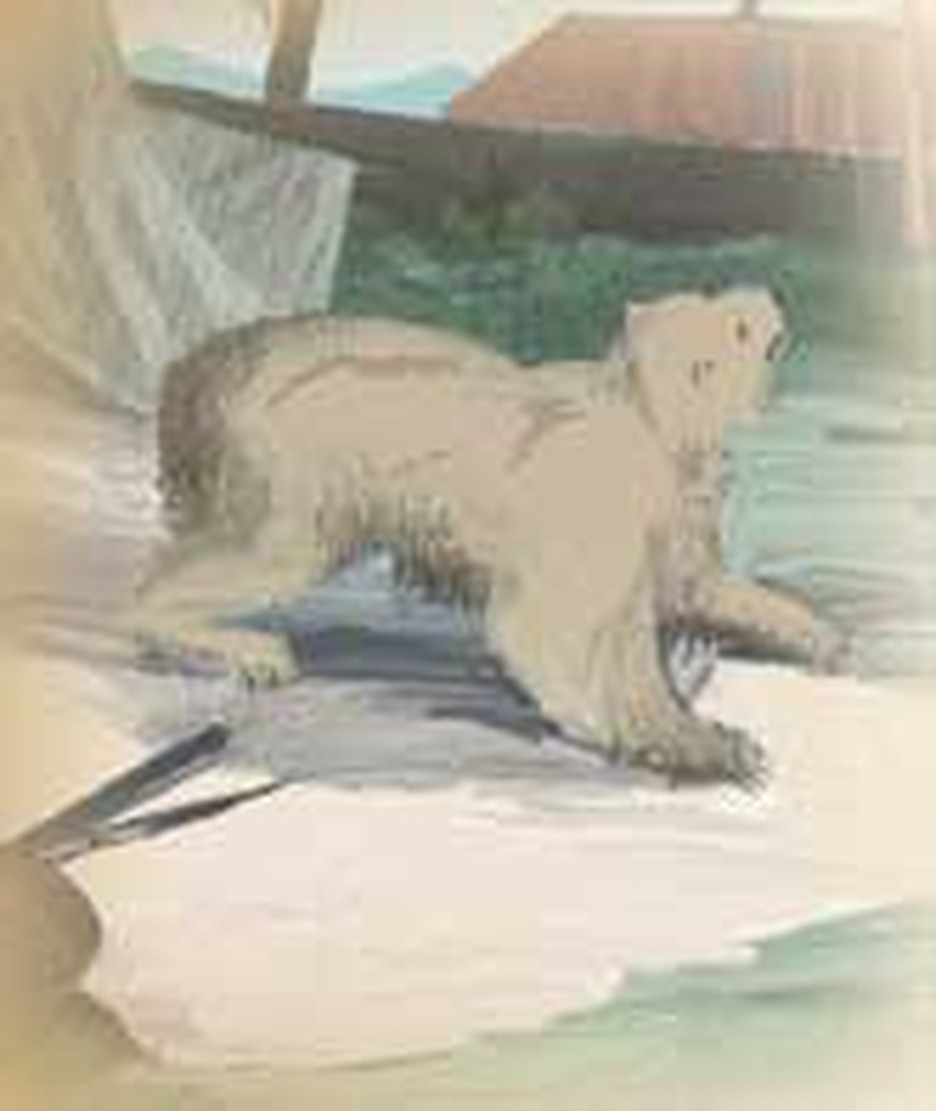
It was late afternoon with the sun sunken low behind the high surrounding hills. A single line of dusty, trail worn trappers trudged slowly through the brushy bottom, leading their pack horses down the valley in search of water and a place to camp.
They were tired and thirsty -- and most of all longing for the sounds and smells of a fine wood fire and fresh fish frying on a pan beside a singing stream.
Sudden Grizzly Greetings
The grizzly came down from the hills and struck at the center of their
line, chasing the horses into the brush. Before the men could retrieve
their rifles from the saddles of their scattered mounts, the massive beast
tore himself from the thicket and ran parallel to the line and to its
front. There the bear came face-to-face with Captain Jedediah Strong Smith.
The grizzly didn't hesitate a moment but sprung on the captain, taking him by the head and smashing him to the rocky ground. Smith fought like a wildcat to loose his butcher knife from its scabbard, but the bear took his head in its monstrous mouth and tore at his middle with both of its awful paws.
The Bear Wouldn't Quit
The grizzly's great grip snapped the captain's knife and several of his
ribs all at the same time. Jim Clyman had his gun handy by then, but he
was afraid that the captain was already a near done man.
Clyman put a bullet into the bear's big stomach, and that pulled the beast off the captain -- but it didn't stop its rage. Ed Rose fired a slug into its head, and it went down. Then a few more of the men shot it again. You can't trust a grizzly to die until you hit it four or five times -- and then you better not turn your back too soon either!
But the captain just lay there looking up as calm as can be. No moaning, no cursing, no rage as would have come from the rest of his men if they'd had their heads nearly bitten off by a mountain bear. "Boys," Smith said as he caught his breath, "you gotta fix me up!"
"Take hold of the captain," said Clyman to Thomas Fitzpatrick, who was bending down over the wounded man, "and we'll carry him to water."
But nobody wanted to move him, he was hurt so badly. So they asked him what was best. "Go for water," Smith said. "And if you've got a needle and thread, get it out and sew up my wounds."
Instant Surgeons
His head was bleeding like a river runs, and none of the party knew anything
about surgical matters, but they had to do something. So Clyman got out
a pair of scissors, cut off Smith's hair, and began his first job of dressing
wounds.
The bear had jawed down close to Smith's left eye on one side and close to his right ear on the other and had laid the skull bare nearly to the crown of his head. One of his ears was torn from his head and barely hanging on. And there was James Clyman of Virginia with one big old needle and some black thread!
Clyman stitched him up as best he could, while the captain gave directions himself. The ear was last of all.
"I can't do it, Jed," Clyman protested. "It's too torn up."
They Even Saved the Ear
"Oh, you must try to stitch it up some way or other," Smith said. And
so Clyman put the needle in and stitched that ear through and through,
laying the lacerated parts together as nice as he could. When it was done,
the captain was able to get up and mount his horse. They rode about a
mile from there to the water they'd found and pitched their camp. With
only one tent, Smith was made as comfortable as circumstances would permit.
This day gave them a lesson of the character of the grizzly bear that they did not forget. And it taught them even more about the kind of man who was leading them through the wilderness.
Jedediah Strong Smith (1799-1831), son of Jedediah Smith, Sr. and Sally Strong, was born at Jericho (now Bainbridge, near Binghamton) in the Susquehanna Valley of southern New York -- the sixth of fourteen children.
When Jed was a tall, sober lad of 12, Dr. Titus Simons, a hometown physician, taught him to read and write in English and Latin. At 13, while working on a freight boat on the Great Lakes, Jedediah met the fur traders of Canada and the Upper Missouri who fueled his fertile imagination with visions of the wide wilderness of the great West.
In the spring of 1821, Jed left home. With only his rifle, his Bible, and the shirt on his back, he found his way to St. Louis, the bustling center of the rapidly rising western fur trade. From there on May 22, 1822, he headed toward the western wilderness on an organized expedition of "enterprising young men" to ascend the Missouri River at its source in search of beaver, which was then in great demand.
Though Jed was but a greenhorn "mountain man," he quickly emerged as head of his company, which included the likes of Jim Bridger, Hugh Glass, James Clyman, Thomas Fitzpatrick, William Sublette and the now legendary Mike Fink -- men who were called "The Reckless Breed" and described by another as "the most significant group of continental explorers ever brought together."
In the annals of his fellow mountain men and their more civilized contemporaries, the record is clear and consistent concerning Smith's unmatched leadership, exceptional courage, and unblemished Christian character. His closest compatriots said he made religion "an active principle from the duties of which nothing could seduce him." His own journals and letters are full of candid, self-effacing confessions of faith and spiritual need. Biographer Alson J. Smith said Smith "was something of an anachronism on a lusty frontier of which it was said that God was careful to stay on his own side of the Missouri River. He was a devout Methodist who did not smoke or drink or use the profanity that was almost the lingua franca of the mountain men. No woman, no matter how attractive, was ever invited to share his bed."
A man of Christian conscience as tall and unmoving as the mountains he climbed, Jedediah Smith is truly one of America's great western heroes and Christian models.
Honor thy Father and Mother
The devotion of Smith to God, the faith and his family was reflected in
his December 24, 1829, letter to his parents from the Wind River on the
east side of the Rockies: It is a long time since I left home and I feel
the need of the watch and care of a Christian Church -- you may well suppose
that our society is of the roughest kind. Men of good morals seldom enter
into business of this kind. I hope you will remember me before the throne
of grace.
Jedediah Strong Smith was an adventurous young man, but he was no shiftless runaway. High on his list of reasons for facing the daunting challenges of the unmapped west was providing needed income for his aging parents. He wrote home when he could, sending money to his father and mother and making arrangements for their care as they grew older and more infirm. He also saw to the housing and schooling of his minor brothers and children.
To his elder brother Ralph he wrote, "It is that I may be able to help those who stand in need that I face every danger -- it is for this that I traverse the mountains covered with eternal snow -- it is for this that I pass over the sandy plains in the heat of summer, thirsty for water. It is for this that I go for days without eating and am pretty much satisfied if I can gather a few roots, a few snails, or, much better a piece of horse flesh or a fine roasted dog. Let it be the greatest pleasure that we can enjoy to smooth the pillow of [our parent's] age and as much as in us lies, take from them all cause of trouble."
The sum of money Jed sent to the family at the time of this letter was $2,200, no small pocket- book in that day.
Jedediah Smith's Incredible Career
In his mere eight years in the West, Smith made history.
- With Thomas Fitzpatrick, he discovered South Pass, the gateway to the continent.
- He was the first white man to cross the Sierra Nevada.
- First to walk into California from the American frontier.
- First to taste the bitter waters of the Great Salt Lake.
- First to compass the whole of the Great Basin.
- First to enter Oregon while trekking up the California coast.
- First to officiate a public Christian worship in South Dakota!
- He survived frigid winters, scorching summers, ravages of timber wolves and grizzly bears, two horrific massacres and a bloody melee with Indians.
- He died alone on the Sante Fe Trail, ambushed by Comanche.
Who Will Say a Prayer?
On May 31, 1823, early in his Western adventures, Smith and his men were
brutally attacked in their encampment just outside twin villages of the
Ree Indians of South Dakota. Thirteen trappers died in the massacre and
eleven wounded.
At an impromptu burial of the dead, Jedediah stepped forward to pray to God whose judgment had come upon them this day and of whose love the survivors sorely needed. The graves were marked only with a log, for fear that the Indians would discover and unearth the bodies. This sad wilderness funeral has been called "the first recorded act of public worship in South Dakota." It is boldly commemorated in a highly imaginative mural in the South Dakota State Capitol.
Of Further Interest- The Jedediah Smith Society is headquartered at the University of the Pacific in Stockton, CA, c/o the John Muir Center for Regional Studies, History Department, University of the Pacific, Stockton, CA 95211. Phone (209) 946-2527.
- The Jedediah Smith Wilderness abuts the Grand Teton National Park (contact the Targhee National Forest Supervisor's Office, P.O. Box 208, St. Anthony, ID 83445).
The dress of the mountain man was typically buckskin garments fringed at the seams, moccasins made of deer or buffalo hide, leather belt for pistols and butcher knife, bullet pouch strung from the waist and powder horn slung under the right arm. His long, matted hair was largely hidden under a feather-adorned wool hat. And in Indian country, a thigh-length stiff overcoat of deerskin was added as protection against the arrows of the natives.








